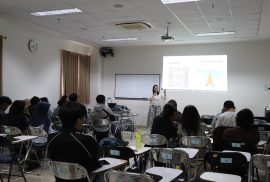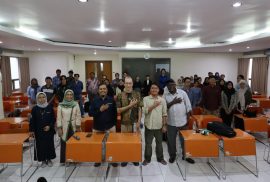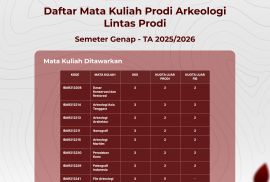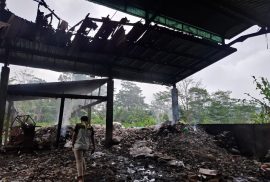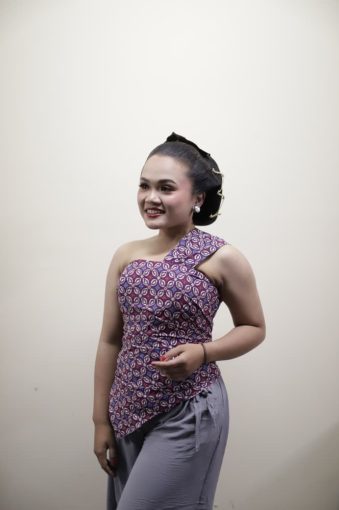
Ervita Ninda Iswantari or Ninda, was born in Gunungkidul on June 18, 2002. She is an archaeology student at Gadjah Mada University, class of 2020, with a strong interest in the arts, particularly vocal arts and Javanese traditions. Since childhood, the world of art has been an important part of her life.
Since kindergarten, Ninda has shown talent and courage in singing. She often participated in singing competitions for both national songs and traditional children’s songs, which marked the beginning of her journey in the world of vocals. Her love for music continued to grow throughout elementary, middle, and high school, where she actively participated in choir and gamelan activities. This involvement fostered a love for traditional arts and introduced her to the rich culture of Java, especially in terms of vocals and karawitan.
Ninda’s journey in pursuing traditional vocals or sindhenan began when she entered college in 2020 at the Department of Archaeology at UGM. Her desire to gain a deeper understanding of Javanese culture led her to join UKM Swagayugama, a student activity unit focused on karawitan art. Her motivation was simple yet meaningful: she wanted to experience performing at Keraton Yogyakarta, a sacred place for practitioners of traditional art.
Ninda joined UKM Swagayugama at the end of 2020, during the COVID-19 pandemic, when all activities were still conducted online. Despite the limitations at the time, her enthusiasm for learning and developing never waned. A year later, in 2021, she had the valuable opportunity to perform in the UKM Swagayugama Ambal Warsa Stage, a large annual performance held in a hybrid format (online and offline). Since then, Ninda has continued to be active in various UKM Swagayugama performances until 2025.
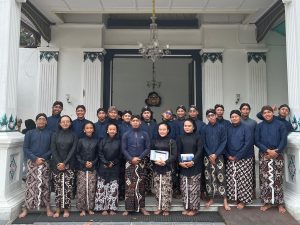
Her dedication to the arts led to Ninda being entrusted with leading the organization. In 2022, she was appointed as the Chair of UKM Swagayugama for one term. During her tenure, the club received many offers to perform karawitan, both at the university level and outside the campus. This was an important moment for Ninda to further explore Javanese karawitan compositions, broaden her musical horizons, and strengthen her understanding of the Yogyakarta style of sindhenan. This year, Ninda also had the opportunity to participate in the Pentas Kraton for the first time, a dream she had since entering university.
After her leadership term at UKM Swagayugama ended, Ninda was once again entrusted with a greater responsibility, namely becoming the Coordinator of the FORKOM UKM UGM Arts Secretariat in 2023. Through this role, she interacted with various cross-disciplinary arts communities within the university, expanding her network and strengthening the spirit of collaboration among young artists.
Not stopping at sindhenan, in 2022 Ninda began to explore other music genres. She tried her hand at being a band vocalist, a keroncong singer, and a campursari singer. This step shows her courage and flexibility as a young musician who not only wants to preserve tradition but also bridge the gap between modern and traditional music.
Even so, Ninda realizes that being a young sinden is not always easy. In the eyes of some younger generations, the profession of sindhen is often considered old-fashioned, mystical, or even embarrassing—singing Javanese songs, wearing Javanese clothing and a sanggul (traditional hairstyle), and performing in a traditional cultural context is considered unmodern. However, for Ninda, such views are a challenge in themselves. She considers this profession to be very valuable and meaningful, as sinden are guardians of cultural heritage that is now increasingly rare.
“If not us, who else will carry on the tradition of senior sinden?” she said enthusiastically. She believes that preserving traditional arts can start with simple things, such as listening to Javanese music. “Try adding one or two Javanese songs to your friends’ playlists. It’s very soothing,” she added.
As an archaeology student, Ninda often gets questions from people around her: “Why are you studying archaeology but singing? Isn’t that irrelevant to your major? Oh, I thought you were studying Javanese literature? Oh, UGM has an arts major? Who would have thought it was Archaeology?” and many other questions directed at Ninda. She wisely responded that archaeology is not only about inanimate objects, but also about living culture. For Ninda, traditional arts such as karawitan and sindhenan are tangible forms of “living archaeology,” traces of the past that are still breathing and evolving today.
Additionally, the world of vocals is an important part of her passion and profession. She feels fortunate to be able to turn her hobby into a source of income. “It’s wonderful to be able to pursue my hobby while earning a living. It’s tiring, of course, but it doesn’t feel tiring because everything is done with the heart,” she said.
For Ninda, singing is not just entertainment, but a cultural responsibility. She hopes that more young people will dare to pursue traditional arts, preserve their ancestral heritage, and keep Javanese culture alive amid the tide of modernization. From a little girl who loved to sing, Ninda grew into a powerful young sinden who loves culture and continues to strive to maintain harmony between the past and the present through the sounds and rhythms that come from her heart.
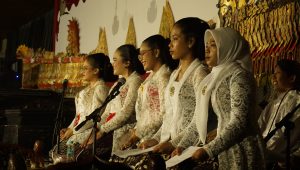
Ninda is also active in the world of events and culture. When she entered college, she actively contributed to internal and external UGM organizations in event production. Since 2024, she has pursued a career as a wedding organizer crew member, where she has successfully handled dozens of weddings with various concepts and scales. This experience has shaped Ninda’s diligence, communication skills, and sensitivity to detail and aesthetics, making her a professional and reliable figure in every special moment she helps bring to life.
In 2025, Ninda expanded her work in cultural preservation by joining Dimas Diajeng Gunungkidul for the 2025–2027 period. Through this role, she is committed to promoting the tourism, cultural, and local wisdom potential of Gunungkidul. Her involvement reflects her passion for combining professionalism in the world of events with dedication to regional culture, as well as representing a young generation that is empowered, cultured, and makes a real contribution to society.
Ervita Ninda Iswantari’s life journey reflects a combination of a love of art, dedication to culture, and a passion for continuous development. From a young child who loved singing to becoming a young singer, organizer, and cultural ambassador for the region, Ninda demonstrates that preserving ancestral heritage does not mean rejecting progress, but rather connecting the past with the present through works and tangible actions. Culture will never fade as long as there are generations who love and protect it with all their hearts.

